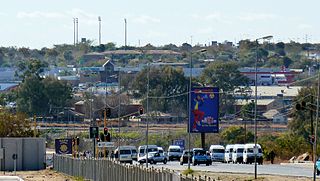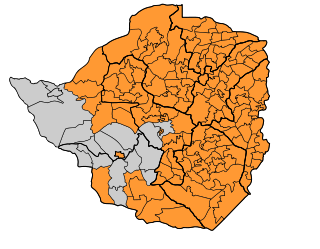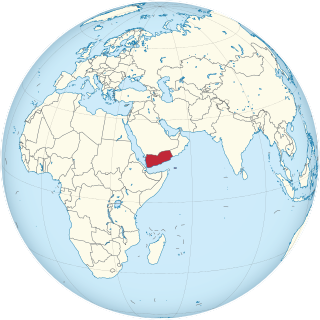
Hammanskraal is a trans-provincial region anchored in northern Gauteng province, South Africa. The region consists of multiple, residential, industrial and commercial areas in a decentralized settlement pattern.

The fourth cholera pandemic of the 19th century began in the Ganges Delta of the Bengal region and traveled with Muslim pilgrims to Mecca. In its first year, the epidemic claimed 30,000 of 90,000 pilgrims. Cholera spread throughout the Middle East and was carried to the Russian Empire, Europe, Africa, and North America, in each case spreading via travelers from port cities and along inland waterways.

The 2008 Zimbabwean cholera outbreak was an epidemic of cholera affecting much of Zimbabwe from August 2008 until June 2009. The outbreak began in Chitungwiza in Harare Metropolitan Province in August 2008, then spread throughout the country so that by December 2008, cases were being reported in all 10 provinces. In December 2008, The Zimbabwean government declared the outbreak a national emergency and requested international aid. The outbreak peaked in January 2009 with 8,500 cases reported per week. Cholera cases from this outbreak were also reported in neighboring countries South Africa, Malawi, Botswana, Mozambique, and Zambia. With the help of international agencies, the outbreak was controlled, and by July 2009, after no cases had been reported for several weeks, the Zimbabwe Ministry of Health and Child Welfare declared the outbreak over. In total, 98,596 cases of cholera and 4,369 deaths were reported, making this the largest outbreak of cholera ever recorded in Zimbabwe. The large scale and severity of the outbreak has been attributed to poor sanitation, limited access to healthcare, and insufficient healthcare infrastructure throughout Zimbabwe.

The 2010s Haiti cholera outbreak was the first modern large-scale outbreak of cholera—a disease once considered beaten back largely due to the invention of modern sanitation. The disease was reintroduced to Haiti in October 2010, not long after the disastrous earthquake earlier that year, and since then cholera has spread across the country and become endemic, causing high levels of both morbidity and mortality. Nearly 800,000 Haitians have been infected by cholera, and more than 9,000 have died, according to the United Nations (UN). Cholera transmission in Haiti today is largely a function of eradication efforts including WASH, education, oral vaccination, and climate variability. Early efforts were made to cover up the source of the epidemic, but thanks largely to the investigations of journalist Jonathan M. Katz and epidemiologist Renaud Piarroux, it is widely believed to be the result of contamination by infected United Nations peacekeepers deployed from Nepal. In terms of total infections, the outbreak has since been surpassed by the war-fueled 2016–2021 Yemen cholera outbreak, although the Haiti outbreak is still one of the most deadly modern outbreaks. After a three-year hiatus, new cholera cases reappeared in October 2022.

Seven cholera pandemics have occurred in the past 200 years, with the first pandemic originating in India in 1817. The seventh cholera pandemic is officially a current pandemic and has been ongoing since 1961, according to a World Health Organization factsheet in March 2022. Additionally, there have been many documented major local cholera outbreaks, such as a 1991–1994 outbreak in South America and, more recently, the 2016–2021 Yemen cholera outbreak.
As of 24 September 2012, a cholera outbreak in Sierra Leone had caused the deaths of 392 people. It was the country's largest outbreak of cholera since first reported in 1970 and the deadliest since the 1994–1995 cholera outbreak. The outbreak has also affected Guinea, which shares a reservoir near the coast. This was the largest cholera outbreak in Africa in 2012.

An outbreak of cholera began in Yemen in October 2016. The outbreak peaked in 2017 with over 2,000 reported deaths in that year alone. In 2017 and 2019, war-torn Yemen accounted for 84% and 93% of all cholera cases in the world, with children constituting the majority of reported cases. As of November 2021, there have been more than 2.5 million cases reported, and more than 4,000 people have died in the Yemen cholera outbreak, which the United Nations deemed the worst humanitarian crisis in the world at that time. However, the outbreak has substantially decreased by 2021, with a successful vaccination program implemented and only 5,676 suspected cases with two deaths reported between January 1 and March 6 of 2021.

The 2017–2018 South African listeriosis outbreak, also known as Listeriosis Histeriosis, was a widespread outbreak of Listeria monocytogenes food poisoning that resulted from contaminated processed meats produced by Enterprise Foods, a subsidiary of Tiger Brands, in Polokwane. There were 1,060 confirmed cases of listeriosis during the outbreak, and about 216 deaths. It is the world's deadliest listeriosis outbreak.

Mathume Joseph Phaahla is a South African politician who served as the Minister of Health from August 2021 until the elections of 29 May 2024. He was formerly the Deputy Minister of Health from May 2014 to August 2021, and on 30 June 2024, President Cyril Ramaphosa reappointed back to Deputy Minister of Health. He had been a deputy minister since May 2009, when he joined the National Assembly. He is also a member of the National Executive Committee of the African National Congress (ANC).

The COVID-19 pandemic in mainland China is part of the worldwide pandemic of coronavirus disease 2019 (COVID-19) caused by severe acute respiratory syndrome coronavirus 2 (SARS-CoV-2). China was where the first COVID outbreak occurred, the first where authorities imposed drastic measures in response, and was one of the first countries to bring the outbreak under control, at least temporarily.
The COVID-19 pandemic in Cameroon was a part of the worldwide pandemic of coronavirus disease 2019 caused by severe acute respiratory syndrome coronavirus 2. The virus was confirmed to have reached Cameroon on 6 March 2020.
The COVID-19 pandemic was confirmed to have reached Somalia on 16 March 2020 when the first case was confirmed in Mogadishu. The Somali Prime Minister, Hassan Ali Khaire announced that the government has set aside five million dollars to deal with the disease. The Somali Medical Association is concerned that the death toll in the country will be huge and that Somalia will not be able to recover from the economic effects due to poor working relations between central government and federal states which leads to lack of control by central government, as well and the lack of healthcare infrastructure. It has also been speculated that President Mohamed Abdullahi Mohamed may use the pandemic as an excuse to postpone elections. There have also been concerns over freedom of the press following arrests and intimidation of journalists who have been covering the pandemic in Somalia.
The COVID-19 pandemic in Madagascar is part of the ongoing worldwide pandemic of coronavirus disease 2019 caused by severe acute respiratory syndrome coronavirus 2. On 20 March 2020, the first case in Madagascar was confirmed in Antananarivo.
The COVID-19 pandemic in South Sudan is part of the ongoing worldwide pandemic of coronavirus disease 2019 caused by severe acute respiratory syndrome coronavirus 2. The virus was confirmed to have reached South Sudan on 5 April 2020. The first four confirmed cases were all UN workers.
The COVID-19 pandemic in Tanzania was a part of the ongoing worldwide pandemic of coronavirus disease 2019 caused by severe acute respiratory syndrome coronavirus 2. The COVID-19 pandemic was confirmed to have reached Tanzania in March 2020.
The first confirmed case relating to the COVID-19 pandemic in Yemen was announced on 10 April 2020 with an occurrence in Hadhramaut. Organizations called the news a "devastating blow" and a "nightmare scenario" given the country's already dire humanitarian situation.

In October 2022, an outbreak of cholera began in Lebanon. It is likely the result of a serious outbreak in neighboring Syria, which is itself traced back to contaminated water in the Euphrates.
Events in the year 2023 in South Africa.

Kgosientsho David "Sputla" Ramokgopa is a South African politician who was the Minister in the Presidency responsible for Electricity from 2023, and the Minister of Electricity and Energy from 3 July 2024. He was the Mayor of Tshwane from 2010 to 2016. He was also a Member of the Executive Council in the Gauteng provincial government in 2019 and worked in the Presidency of South Africa as head of infrastructure from 2019 to 2023.










